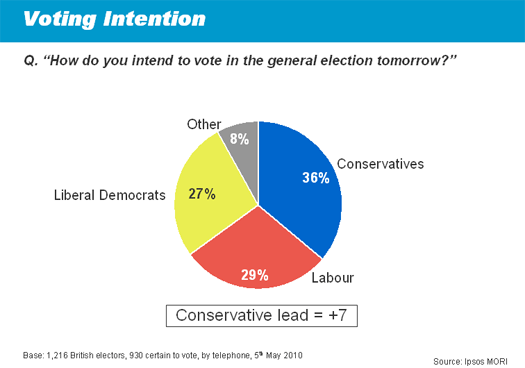Ipsos Final Election Poll
Ipsos - Final Election Poll
Fieldwork: 5 May 2010
CON 36% (+3); LAB 29% (-7); LIB DEM 27% (+5)
Ipsos's Final Election Poll for the Evening Standard indicates that Britain may be on course for a hung parliament, with the Conservatives the largest party but short of an overall majority. Voting intention among those who are certain to vote, plus those who have already voted by post, is Conservative 36%, Labour 29%, Liberal Democrat 27%, Others 8%. The poll is based on interviews conducted on Wednesday 5th May, making it the most up to date of all the published pre-election polls.
These figures represent a 5% swing to the Conservatives since 2005. If the election results show this swing uniformly across all constituencies, the Conservatives would gain 79 seats but would still be left about 50 seats short of an overall majority. Labour would lose 94 seats and the Liberal Democrats would gain 17 seats.

In this final poll, which is our forecast for the final election outcome, Ipsos's voting intention figures are based only on the responses of the 930 respondents who said that they were "absolutely certain to vote" or that they had already voted by post.
Our final poll in Lab-Con marginals for Reuters, released on Monday, showed a 7% swing in key battleground constituencies - enough to give them the smallest of majorities - suggesting that the Conservatives may do better than uniform swing in these areas. If there is a bigger swing in these marginal seats, this could leave the Conservatives tantalizingly close to a majority (only around 20 seats short).
Just a day before polling day, three in ten voters say they may yet change their mind about who they will vote for (30%). This is slightly higher than the day before the 2005 election when 27% said they may change their mind, and significantly higher than in 2001 when 21% were still wavering with just a day to go. In 2010, the Liberal Democrat and Labour vote appears to be softest, with a third of supporters saying they may change their mind (34% and 32% respectively), compared to only one in five Conservative supporters (20%).
Of those who may change their minds, a quarter would switch to the Liberal Democrats (25%), while slightly fewer would switch to Labour (18%) or the Conservatives (17%). Tory and Labour supporters who may change their minds are more likely to switch to the Lib Dems than each other, while more wavering Lib Dems would support Labour than the Conservatives.
One in ten voters are voting tactically (10%). Lib Dem voters are more likely to be doing so (16%); almost half of these tactical Lib Dem supporters say they would actually prefer Labour to win (48%).
David Cameron is seen as the most capable Prime Minister (33%), compared to 29% who say Gordon Brown and 19% who say Nick Clegg. Cameron has lost support since February (38% said he would be most capable), while Clegg has gained in credibility (up from 12% in February).
Despite current voting intentions pointing towards a hung parliament, over half of the public think that it would be bad for the country if no party achieves an overall majority (55%). If this were to happen, more people would like to see all three parties working together (33%) than any two parties working in coalition. Over four in five people say that it is important to them personally who wins the general election (84%), compared to 80% who said the same before the 2005 election.
Three quarters of the public say they have watched any of the leader debates (72%). A large majority have received political leaflets over the past few weeks (93%, compared to 89% in 2005), while far fewer have been called on by a representative of a political party (21%, exactly in line with 2005) and only 5% have been telephoned by a party representative (7% in 2005).
- Download the poll topline (PDF)
- Download the full computer tables (PDF)
- Download the trends and charts (PDF)
Technical Details
Ipsos interviewed a representative sample of 1,216 adults aged 18+ across Great Britain who also say they are registered to vote. Interviews were conducted by telephone on 5th May 2010. Ipsos's voting intention figures are based only on the responses of the 930 respondents who said that they were "absolutely certain to vote" or that they had already voted by post.
In these final projection figures, adjustments were also made to account for those respondents who said they were certain to vote or had voted but refused to say which party they supported (calculated on the basis of respondents' newspaper readership). This adjustment made no difference to the topline voting intention figures.
Data are weighted to match the profile of the population.



